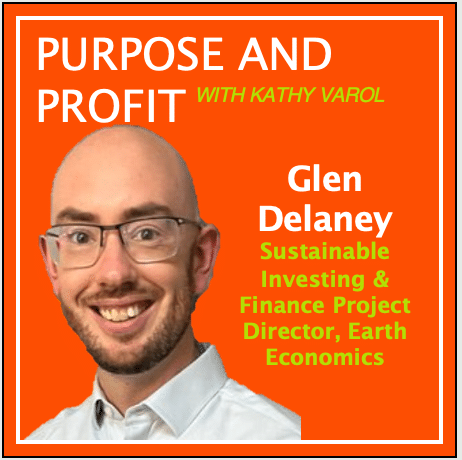Show Notes:
Glen Delaney is a project director at the nonprofit Earth Economics. Earth Economics quantifies and values the benefits nature provides, driving effective decisions and systemic change through a combination of education, natural capital analysis, and policy recommendations. As businesses begin to explore their impact and dependency on nature, valuation is a useful tool for integrating nature into their existing frameworks.
In his role, Glen works with climate-impacted communities, tribes, and governments to value ecosystem services—the benefits created by nature—translating their work protecting and restoring nature into a dollar figure.
In this episode we discuss:
✅ What “ecosystem goods” and “ecosystem services” are and why they’re valuable
✅ How and why businesses are starting to value nature
✅ Frameworks that help businesses embed nature into their strategy and decision-making
3 episode takeaways (listen to the full episode for a lot more gems!):
1️⃣ The Economic Wake-Up Call from Nature. The conversation around nature’s value is growing louder, especially as we confront a critical juncture where environmental degradation and climate change start to hit our wallets. Look at California, where leading insurers like State Farm and Allstate stepped back from renewing homeowner policies in 2024 due to increasing risks. This move strips individuals of coverage, leaving them to face financial vulnerabilities on their own. Companies too are grappling with the tangible impacts of climate change, from droughts affecting manufacturing to unpredictable crop yields in supply chains.
It’s a stark reminder of an old adage: we often fail to appreciate what we have until it’s under threat. Our collective delay in valuing nature’s gifts is now being countered with the harsh reality of its decline, signaling an urgent call for environmental stewardship.
***
2️⃣ Climate Change: The Economics of Health Impacts. The repercussions of climate change extend well beyond financial losses, touching the very essence of our well-being. Health insurance companies are also considering adjusting premiums to reflect the increased risks associated with environmental shifts. Wildfires deteriorating air quality, extreme heatwaves, and out-of-character flooding are translating into higher medical claims and hospitalizations. Droughts leading to wildfires not only claim lives and devastate communities but also jeopardize access to healthcare, contaminate water sources, and degrade air quality far beyond the immediate areas of the fires.
* * *
3️⃣ A Global Domino Effect: From Human Migration to Food Security. While the U.S. may not be grappling with climate-induced migration or food security yet, the global nature of our supply chains and the pandemic have highlighted our interconnectedness. Events unfolding across the globe offer a glimpse into potential future scenarios closer to home. Our global interdependence reminds us that the impacts of climate change are not confined by borders.
References:
- Connect with Glen on LinkedIn
- Earth Economics
- The Natural Capital Protocol framework by Capitals Coalition
- Task Force for Nature-related Financial Disclosures
- inVEST by the Natural Capital Project, Stanford University
- The Nature Conservancy
- Kresge Foundation
- Soil and Water Outcomes Fund by Quantified Ventures
- Avahoula Climate Mitigation Project with Pachama & Delta Land Services
- Stitching the West Back Together: Conservation of Working Landscapes, edited by Susan Charnley, Thomas E. Sheridan, and Gary P. Nabhan
- Purpose and Profit episode with Fawn Bergen, lead of Intel’s Corporate Sustainability Group
- Ecosystem Services Valuation Database (ESVD)

